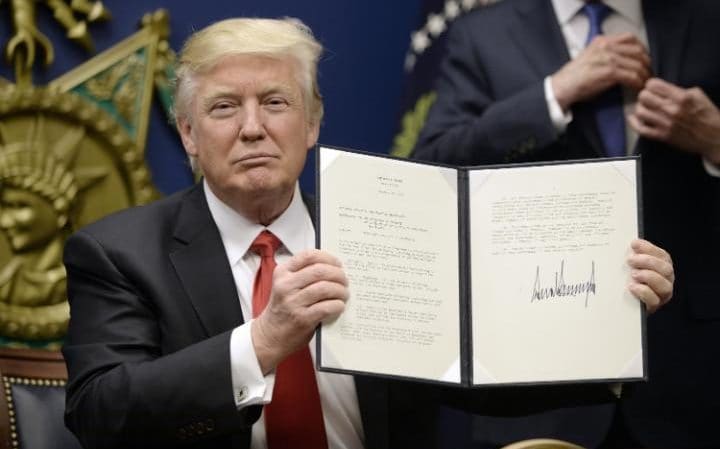President Donald Trump signed an executive order limiting travel from seven Middle Eastern countries in an attempt to prevent terrorism on Friday, Jan. 27, sparking outrage among Democrats, equal rights activists and the families of green card holders who were denied entry.
While White House press insists that this executive order is not a ban, it was called a “travel ban” multiple times by the President himself and others in his administration.
The executive order, for all intents and purposes, put a halt on refugee entry into the United States for 90 days, with Syrian refugees being suspended indefinitely. The countries, all predominantly Muslim, affected by this ban are Iraq, Syria, Iran, Yemen, Sudan, Libya, and Somalia.
Saudi Arabia, a country with which Trump has strong business ties, was not included in this ban. Incidentally, the terrorist attacks on September 11, 2001, were carried out by radicals predominately from Saudi Arabia.
Pre-approved refugees, students and workers with a visa, as well as green card holders, were detained at 11 different airports across the country following the implementation of the executive order, leading a Federal judge in Seattle to issue a temporary nationwide stop.
While this issue has received global coverage, it is important to consider how it will effect students and faculty here at Capital.
Naima Ilmi, president of the Muslim Student Association (MSA), said that this executive order, “should serve as a wake up call to people … Once the rights of one group are infringed upon, [others] rights will soon follow … Just because something doesn’t impact you personally does not mean it it not happening.”
The College Republicans have a different view on the executive order.
“College Republicans and the Republican National Committee both stand behind the President’s decision to temporarily halt immigration from the seven countries listed,” said Matt St. Clair, president of the Capital chapter.
St. Clair said that the executive order restricting travel is not a Muslim ban, and the term is “misleading and downright incorrect.” He said that the purpose is only to protect Americans from acts of terrorism.
“Recently, we’ve seen a tragedy occur in our backyard at The Ohio State University, where a refugee from one of the countries included in the temporary ban carried out a vicious attack on American students just like us.”
Thankfully no one was killed in this attack, except for the attacker, who was shot by police. He had moved from Somalia to Pakistan in 2004, and to the United States in 2014. He claimed to have carried out this crime due to being tired of seeing his people killed, persecuted, and slandered, simply for being Muslim.
In terms of the executive orders ability to stop terror attacks, “no person accepted to the United States as a refugee, Syrian or otherwise, has been implicated in a major fatal terrorist attack since the Refugee Act of 1980 set up systematic procedures for accepting refugees into the United States,” according to an analysis of terrorism immigration risks by the Cato Institute.
Prior to 1980, three refugees carried out terrorist attacks. All three were Cuban refugees, and a total of three people were killed.
While such acts of terror are certainly a cause for concern, Ilmi argues that students need to come together.
“MSA’s mission is to foster interfaith dialogue and cultivate a safe environment where non-Muslims can learn about the religion,” Ilmi said. “This is done through interactive and educational programs.”
Students who are feeling attacked, victimized, or scared about this executive order can stop by the ODI office in the student union to find out how to get involved on campus and in the community.
President Beth Paul said in an email sent out to student on January 30 that “our learning community is a rich mosaic of people who bring to Capital varied perspectives, different life experiences, and a passion for learning. We are strengthened by these differences, and we champion access to people from all cultures and traditions.”
It is important to remember during this time of uncertainty, anger, and shame, that we are all one human family, and we have got to start treating each other with a little more dignity and respect.
“I want to assure all of our students and employees, documented, undocumented, foreign national and U.S. citizen, [that] Capital is a place where everyone belongs,” President Paul said. “Our mission compels us to transform lives through higher education – not only the lives of U.S. citizens, but all lives we encounter as members of the Cap Family.”

